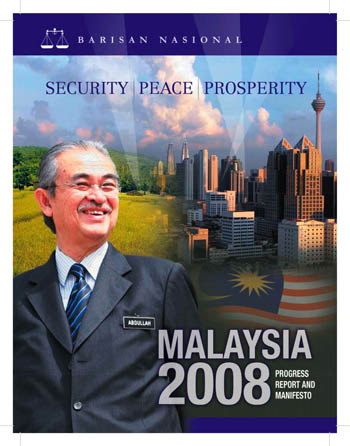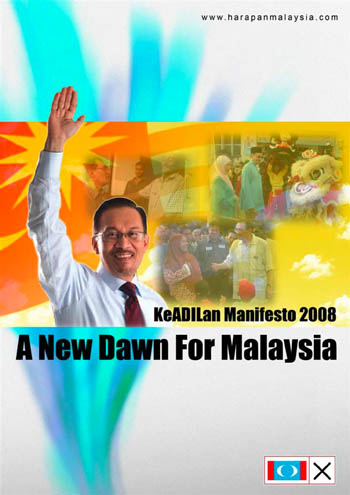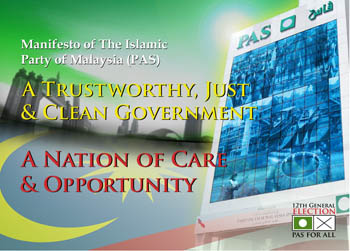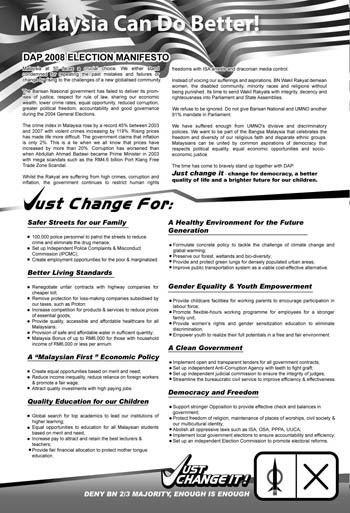 THE political parties announced their manifestos on Feb 25, which represent their public declaration and pledge to uphold their stated principles and goals. How important are manifestos? Do Malaysians, voters and political parties alike, take them seriously enough? Why do some dismiss these documents as promises, promises. In this Q&A, Centre for Public Policy Studies (CPPS) director Tricia Yeoh discusses the significance of manifestos and how they have evolved with the social and political landscape.
THE political parties announced their manifestos on Feb 25, which represent their public declaration and pledge to uphold their stated principles and goals. How important are manifestos? Do Malaysians, voters and political parties alike, take them seriously enough? Why do some dismiss these documents as promises, promises. In this Q&A, Centre for Public Policy Studies (CPPS) director Tricia Yeoh discusses the significance of manifestos and how they have evolved with the social and political landscape.
In light of the rising crime rate and cases of missing children, one common issue that most manifestos have noted in this general election is the need to curb crime and make our streets and homes a safer place. They also pledge to fight corruption.
With the theme “Security, Peace and Prosperity,” the Barisan Nasional’s 24-page manifesto promises to continue to eradicate hardcore poverty, help the small and medium-sized enterprises (SMEs), improve the quality of education, boost development and create jobs through the economic corridors and improve public transport services. It also promises to improve relations between the different racial and religious communities.
 Parti Keadilan Rakyat (PKR), in its 21-page manifesto, vows to adhere to the spirit of the Federal Constitution, eliminate discriminative policies and ensure assistance for all in need. It also aims to improve the economic and market structure to attract more foreign investments and make Malaysia affordable for all, including lowering the price of petrol in line with Petronas’ higher profits.
Parti Keadilan Rakyat (PKR), in its 21-page manifesto, vows to adhere to the spirit of the Federal Constitution, eliminate discriminative policies and ensure assistance for all in need. It also aims to improve the economic and market structure to attract more foreign investments and make Malaysia affordable for all, including lowering the price of petrol in line with Petronas’ higher profits.
In a 42-page manifesto, PAS promises to protect the people’s wellbeing, in particular the welfare of the marginalised, uphold the rule of law, restore the integrity of the judiciary and institute electoral reforms. It also promises to protect the environment and have an integration policy to foster better dialogue and understanding among the different communities.
The DAP condenses its appeal in a flyer, urging voters to “Just Change It” with their ballot – change the existing power structure, push for a Malaysian first policy, quality education, clean government, a healthy environment and a more affordable standard of living.
 The 19-page People’s Declaration, produced by civil society and endorsed mainly by the opposition parties to make a stand as the People’s Front or Barisan Rakyat, pledges to uphold the constitution and push for a range of reforms. These include measures to promote unity, a genuine democracy, clean and independent judiciary, free press, and transparency and accountability in the administrative system. It also promises to pursue equitable and sustainable development, help the SMEs and review the tax system to improve revenue while at the same time reduce the burden on low income groups.
The 19-page People’s Declaration, produced by civil society and endorsed mainly by the opposition parties to make a stand as the People’s Front or Barisan Rakyat, pledges to uphold the constitution and push for a range of reforms. These include measures to promote unity, a genuine democracy, clean and independent judiciary, free press, and transparency and accountability in the administrative system. It also promises to pursue equitable and sustainable development, help the SMEs and review the tax system to improve revenue while at the same time reduce the burden on low income groups.
These are just some of the points in the manifestos. The CPPS, part of the Asian Strategy and Leadership Institute, an independent and non-partisan think-tank, has compiled all the different manifestos in its website.
MalaysiaVotes.com: How important is it for voters to be familiar with the manifestos of the different political parties contesting in this election? What can voters do with these manifestos?
Manifestos are the flesh and bone of any political party, and voters need to be fully aware of what each party stands for. The worst thing is to walk into the polling booth blind and unawares of what they are actually voting in. The manifestos should be read thoroughly and critically examined, not just now before the election but for the next four to five years, holding politicians to their promises contained therein. Manifestos usually include bubbly statements and positive promises but voters should be quick to point out any discrepancies between this and the actual implementation post-election period.
 Are there any common themes emerging from these manifestos – among the BN component parties or the opposition coalition parties, or even between both the BN and the opposition?
Are there any common themes emerging from these manifestos – among the BN component parties or the opposition coalition parties, or even between both the BN and the opposition?
Common themes emerging among the BN component parties are the commitment to work together in the spirit of unity (the way the coalition is structured), emphasising the many economic corridors and in support of the 9th Malaysia Plan. No major changes nor surprises there. Opposition parties highlight rising prices and offer solutions to be taken up, and corruption is a strong theme amongst all manifestos, emphasising the tremendous amount it costs the country – people acknowledge the connection between corruption and the economy, and the opposition takes heed of this.
More striking is the fact that the BN parties paint a glorious, all-too-glowing picture of the country. In their manifesto, Malaysia seems to be an untouchable country sweeping the skies with its wonderful achievements, a place where nothing goes wrong. Contrast this to the image depicted in the opposition manifestos, where Malaysia is shown as a dark country with numerous issues affecting it negatively, warning that failure to address these will result in downfall.
 Are there any interesting themes or promises which have emerged?
Are there any interesting themes or promises which have emerged?
PKR has promised to bring in foreign investment worth RM100 billion in their first five years of implementation, as well as hand out promises given by the opposition – these are optimistic but of course it will be difficult to evaluate how possible or realistic these targets are. From the BN coalition parties, nothing exciting emerges from their manifestos, still the same broad sweeping promises similar to the five-year development plans.
Do you think political parties take these manifestos more seriously now than in the past? What factors do you think influence the content of these manifestos?
They do take it more seriously. As more and more voters become educated and demanding of their leaders, and are able to access information quickly at the tip of their fingers (on the internet, etc), leaders have had to respond likewise. The demand for solid principled manifestos is on the rise, and politicians need to equip themselves with concrete strategies and objectives in order for voters to place their trust in them.
 How about voters? Do you think it influences the way they might vote?
How about voters? Do you think it influences the way they might vote?
Not necessarily. On one level, manifestos are just pieces of paper and voters have seen how parties fail to live up to their promises in the past, leaving them cynical of such manifestos. On another level, by and large, Malaysian voters are not systematic in their analysis of politicians and their parties. Malaysians are emotional voters, and they are more likely to vote according to the race of the candidate, or how they “feel” towards the particular party in question. We are not quite at the stage where manifestos are broken apart piece by piece, much less taken seriously.